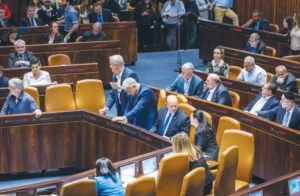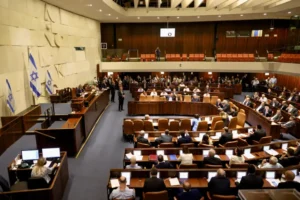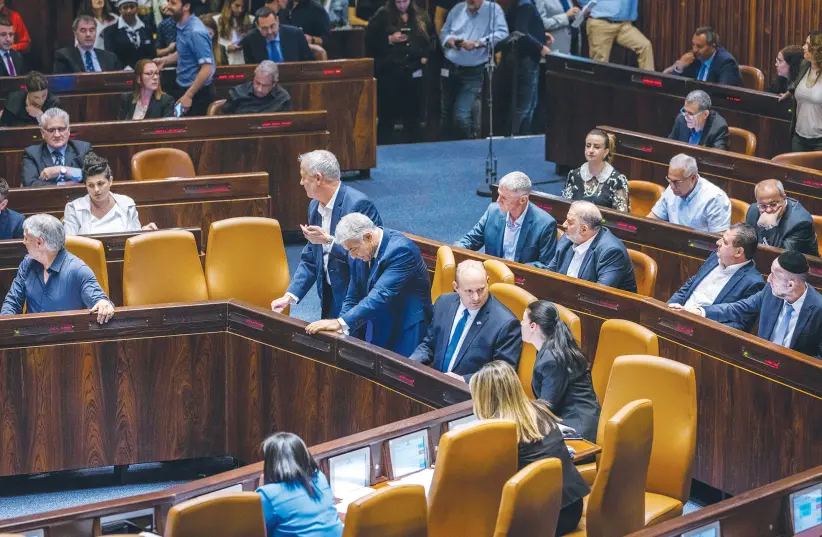Yisrael Beytenu and Labor’s filibuster threat means that the Knesset’s dispersal may stretch past midnight on Wednesday.

Yisrael Beytenu and Labor threatened on Wednesday to filibuster the Knesset Dispersal Bill over the opposition’s refusal to pass the Metro Law and its insistence on raising party funds. This casts doubt on the Knesset’s ability to meet its original goal to disperse by Wednesday at midnight.
The Metro Law sets a framework for expanding Tel Aviv’s light-railway network into a full subway system. If the bill does not pass into law before the Knesset disperses it will be delayed by at least four months until the next Knesset forms.
The opposition wants to block the bill since it is a major victory for Michaeli and for the entire coalition.
In addition, Yisrael Beytenu opposed the funding bill from the start, calling it a “robbery of public funds in broad daylight.”
Parties receive funds based on “funding units.” After the election, each party receives a certain number of units based on the number of seats it wins.

A unit is currently worth approximately NIS 1.4 million. A public committee authorized by law to decide the unit’s size authorized a 12% increase on Wednesday afternoon, meaning each unit will now equal approximately NIS 1.6 million. This will cost the Israeli taxpayer over NIS 21 million.
Yisrael Beytenu voted against the bill’s first reading in the plenum on Wednesday morning.
“We intend to file hundreds of objections to the Knesset Dispersal Bill and the absurdity called ‘party funding raise’ before their final vote and do everything we can in order to pass the Metro Law, which comes to take on the traffic problems in the most significant way possible, while at the same time providing a solution to Israel’s housing and employment challenges,” Yisrael Beytenu head Avigdor Liberman wrote on Twitter.
“During these moments, I expect, at least, from all of my friends in the coalition to put all political considerations aside and act only for the national interest.”
“During these moments, I expect, at least, from all of my friends in the coalition to put all political considerations aside and act only for the national interest.”
Avigdor Liberman
How the loans work
The Knesset parties are allowed to take loans from the Knesset. But due to repetitive elections, many of them have not finished returning them.
The parties currently owe the Knesset over NIS 150 million from last year’s elections, led by the Likud and Labor, according to the Israel Democracy Institute. Despite this, the proposed bill extends the number of payments from 36 to 52 months.
52 months is four years and four months, which is exactly the length of a full Knesset tenure. The bill thus allows the parties to spread out payments over the full length of the next Knesset’s tenure. Since the Knesset rarely survives the full tenure, the bill effectively ensures that the parties will not be able to return their debts.
Yisrael Beytenu and Labor’s filibuster threat means that the Knesset’s dispersal may stretch past midnight on Wednesday.
Israeli Law stipulates that Alternate Prime Minister Yair Lapid would become Prime Minister at midnight at the end of the day of the Knesset’s dispersal. The coalition thus wanted the Knesset to disperse by midnight so that he could be sworn in on Thursday, N12 reported.
The West Bank emergency regulations, which apply Israeli Law to citizens living in the West Bank, expire on Thursday at midnight. The Knesset’s dispersal automatically extends the regulations for six months. If the Knesset does not disperse by then, the settler’s legal status will be unclear.
Likud MKs were told on Wednesday afternoon that the dispersal process was ‘on hold’ and that they were free to leave the Knesset as long as they remain a half hour’s drive away, N12 reported.

